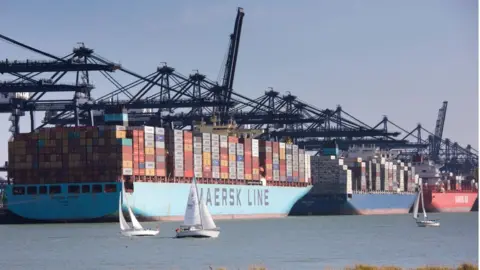UK-Asia trade deal to boost UK economy by 0.08%
 Getty Images
Getty ImagesThe UK has signed a deal to join a trade pact with 11 Asia and Pacific nations, three years after it officially left the European Union.
Joining the group will boost UK exports by cutting tariffs on goods such as cheese, cars, chocolate, machinery, gin and whisky, the government said.
However, the government's own estimates show being in the bloc will only add 0.08% to the size of the UK's economy.
The trade area covers a market of around 500 million people.
The Comprehensive and Progressive Agreement for Trans-Pacific Partnership - or CPTPP - was established in 2018, and includes Australia, Brunei, Canada, Chile, Japan, Malaysia, Mexico, New Zealand, Peru, Singapore and Vietnam.
Membership of the CPTPP loosens restrictions on trade between members and reduce tariffs - a form of border tax - on goods.
Together, the 11 members account for about 13% of the world's income and after 21 months of negotiations, the UK has become the first European country to join.
The government said the agreement was the UK's "biggest trade deal since Brexit".
However, the gains for the UK from joining are expected to be modest. The UK already has free trade deals with all of the members except Brunei and Malaysia, some of which were rolled over from its previous membership of the EU.
And even with some gains in trading the government only estimates it will add 0.08% to the size of the economy in 10 years. The Office for Budget Responsibility (OBR), which provides forecasts for the government, has previously said Brexit would reduce the UK's potential economic growth by about 4% in the long term.
'Prime position'
But Prime Minister Rishi Sunak said the deal demonstrated the "real economic benefits of our post-Brexit freedoms".
"As part of CPTPP, the UK is now in a prime position in the global economy to seize opportunities for new jobs, growth and innovation," he said.
"British businesses will now enjoy unparalleled access to markets from Europe to the south Pacific."
Business and Trade Secretary Kemi Badenoch said the agreement was like "buying a start-up".
"This is not to replace EU trade, this is in addition. We are still in a free trade agreement with the EU," she told Radio 4's Today programme.
"You wouldn't buy a small company like that and expect it to be delivering on the day - we are thinking about the potential," she said, adding that in seven years "40% of the world's middle class is going to come from that region".
Ms Badenoch denied there would be any hit to UK agriculture, saying the deal would "create new markets" for farmers.
Labour's shadow international trade secretary Nick Thomas-Symonds said the UK joining the CPTPP was "encouraging", but added that questions remain on "consumer safety, food safety, data protection and environmental protections".
The government said other "benefits" of being in the bloc included, a boost to the services sector, by UK firms not being required to establish a local office or be resident to supply a service, meaning they will be on a par with local firms.
The government said it and CPTPP members would make the final legal and administrative steps required for the UK to formally sign in 2023.
